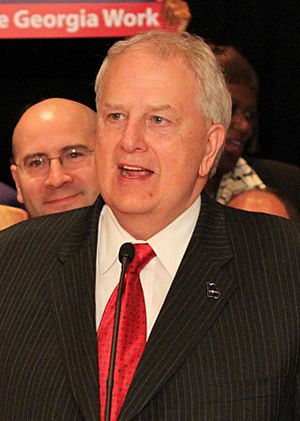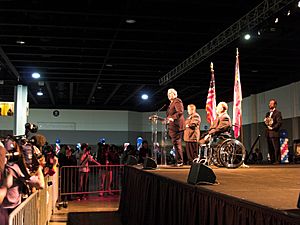Roy Barnes facts for kids
Quick facts for kids
Roy Barnes
|
|
|---|---|

Barnes in 2010
|
|
| 80th Governor of Georgia | |
| In office January 11, 1999 – January 13, 2003 |
|
| Lieutenant | Mark Taylor |
| Preceded by | Zell Miller |
| Succeeded by | Sonny Perdue |
| Member of the Georgia House of Representatives from the 33rd district |
|
| In office November 3, 1992 – November 3, 1998 |
|
| Preceded by | Constituency established |
| Succeeded by | Don Wix |
| Member of the Georgia State Senate from the 33rd district |
|
| In office November 5, 1974 – November 6, 1990 |
|
| Preceded by | Jack Henderson |
| Succeeded by | Steve Thompson |
| Personal details | |
| Born |
Roy Eugene Barnes
March 11, 1948 Mableton, Georgia, U.S. |
| Political party | Democratic |
| Spouse |
Marie Dobbs
(m. 1970) |
| Children | 3 |
| Education | University of Georgia (BA, JD) |
| Military service | |
| Allegiance | |
| Branch/service | |
| Unit | United States Army Reserves |
Roy Eugene Barnes (born March 11, 1948) is an American lawyer and politician. He served as the 80th governor of Georgia from 1999 to 2003. He is the most recent Democrat to have been governor of Georgia.
Barnes was a member of the Georgia Senate from 1974 to 1990. He ran for governor in 1990 but did not win. Later, he served in the Georgia House of Representatives from 1992 to 1998. He ran for governor again in 1998 and won both the primary and general elections easily.
In 2003, Barnes received the Profile in Courage Award. This award was given by the John F. Kennedy Library. He earned it for changing the Georgia state flag. He reduced the size of the Confederate battle emblem on it. Many people believe this change led to him losing his re-election in 2002.
After his term as governor, he went back to practicing law. He also helped lead a group called the Aspen Institute Commission. This group worked on the No Child Left Behind Act, which was about education. He ran for governor one more time in 2010 but lost to Nathan Deal.
Contents
Early Life and Education
Roy Barnes was born on March 11, 1948, in Mableton, Georgia. His family owned a general store. This store was where he first heard people talk about politics.
After finishing South Cobb High School, Barnes went to the University of Georgia. He was part of the debate team there. During his summers, he worked at his family's store. He earned a history degree in 1969. A year later, he married Marie Dobbs, and they had three children.
After college, Barnes studied law at the University of Georgia School of Law. He was chosen as president of the student bar association. He was also named the outstanding senior in his class. He graduated from law school with honors in 1972. After serving four months in the Army, he became a prosecutor in Cobb County.
Political Career in Georgia
Starting in the Georgia Senate
Roy Barnes began his political career in 1974. He was elected to the Georgia State Senate by the people of Mableton. At 26 years old, Barnes was the youngest member of the Georgia Senate. He served eight terms in the Georgia Senate.
After his second term, he became a floor leader for Governor Joe Frank Harris. He was also made the head of the Senate Judiciary Committee. While in the Senate, he worked on important committees like Appropriations and Transportation. He also played a big role in updating the Georgia constitution.
Running for Governor in 1990
After serving eight terms, Barnes decided to run for governor in 1990. He competed against Atlanta Mayor Andrew Young and Lt. Governor Zell Miller. Barnes lost to Miller in the Democratic Primary. Miller later won the election and became a friend to Barnes.
Serving in the Georgia House
Barnes returned to politics in 1992. He was elected to the Georgia House of Representatives. He became the vice chair of the Judiciary Committee. He also led the Subcommittee on General Law. During his time in the Georgia House, he served on other important committees.
Barnes also helped start Georgia State Bank in Mableton. He was on the bank's board of directors from 1986 until 1997. He left the board to run for governor.
Governor of Georgia
Winning the 1998 Election
In 1998, Barnes ran for governor again. He won the Democratic primary against Secretary of State Lewis A. Massey. His campaign focused on improving education and healthcare. He then defeated Republican businessman Guy Millner in the general election. Barnes won with 52% of the votes, becoming the 80th Governor of Georgia.
The Democratic Party kept control of both parts of the legislature. They also kept almost all state-level offices.
Key Actions as Governor
In January 1999, after becoming governor, Barnes took his first big action. He signed an order that stopped lobbyists from giving gifts to state government employees.
Barnes also made a change to the Georgia state flag. This was a big decision and faced some opposition. The state flag had included the Confederate battle emblem since 1956.
His education reforms included ending job security for new teachers. He also stopped "social promotion," which meant students had to pass a test to move to the next grade. Teachers did not like his ideas about job security. However, the Georgia Department of Education supported his plan to end social promotion.
Barnes also created Georgia's Child Advocate Office. This office helps protect children. It was started after the death of five-year-old Terrell Peterson. Barnes also signed the Terrell Peterson Act to help protect children from abuse.
He also suggested new rules for highway safety. These rules aimed to keep young drivers safe. He proposed a curfew for teens at 10 p.m. He also suggested limiting the number of passengers in their cars. Another idea was to ban 16-year-olds from driving alone in some areas.
Losing the 2002 Election
Barnes ran for re-election in November 2002 but lost. This was a surprise defeat. Some people thought his changes to the state flag and his education reforms upset voters. However, many believe his loss was part of a larger shift. More voters in Georgia started supporting the Republican Party at that time. Barnes was defeated by Sonny Perdue. Perdue was the first Republican to be elected Governor of Georgia since the Reconstruction period.
Roy Barnes was known as a very powerful governor. Some people even called him "King Roy." This showed that he knew how to get things done in the legislature.
After Being Governor

After his defeat, Barnes volunteered for six months at the Atlanta Legal Aid Society. He gave free legal advice to people who could not afford it. He also created a website to help people understand their consumer rights.
Profile in Courage Award
In 2003, Barnes received the Profile in Courage Award. This award recognized his brave decision to change the Georgia state flag. He made this change even though it was politically risky.
Barnes Law Group
After his volunteer work, Barnes started the Barnes Law Group. He founded it with his daughter, Allison Barnes Salter, and his son-in-law, John Salter. His long-time law partner, Charles Tanksley, also joined. This firm continued Barnes' private law practice, which he started in 1975.
Working on Education Policy
On February 14, 2006, the Aspen Institute announced a new commission. This group was formed to study the No Child Left Behind Act. Barnes was named co-chair of this commission. He worked alongside former Secretary of Health and Human Services Tommy Thompson.
The commission's goal was to find ways to improve federal education policy. They wanted to help students achieve more. They also aimed to close gaps in learning between different groups of students.
Running for Governor Again in 2010
Barnes announced he would run for governor again in 2010. He made this announcement on June 3, 2009, in his hometown of Marietta, Georgia.
His campaign, called Roy 2010, focused on several key areas. These included creating more jobs, protecting water sources, making education better, and improving transportation.
Barnes won the Democratic Primary on July 20, 2010. He then faced Republican Nathan Deal and Libertarian John Monds.
On November 2, 2010, Barnes accepted his defeat to Deal. Deal won as many Republican candidates gained support in the 2010 elections.
Images for kids
 | Mary Eliza Mahoney |
 | Susie King Taylor |
 | Ida Gray |
 | Eliza Ann Grier |



